Critical Analysis of Major Depression in Primary Care
VerifiedAdded on 2023/01/05
|7
|1946
|90
AI Summary
This critical analysis focuses on major depression in primary care, discussing the scenario of a person living with major depression, therapeutic interventions available, and barriers and enablers in accessing these interventions. Gain valuable insights on mental health and primary care.
Contribute Materials
Your contribution can guide someone’s learning journey. Share your
documents today.
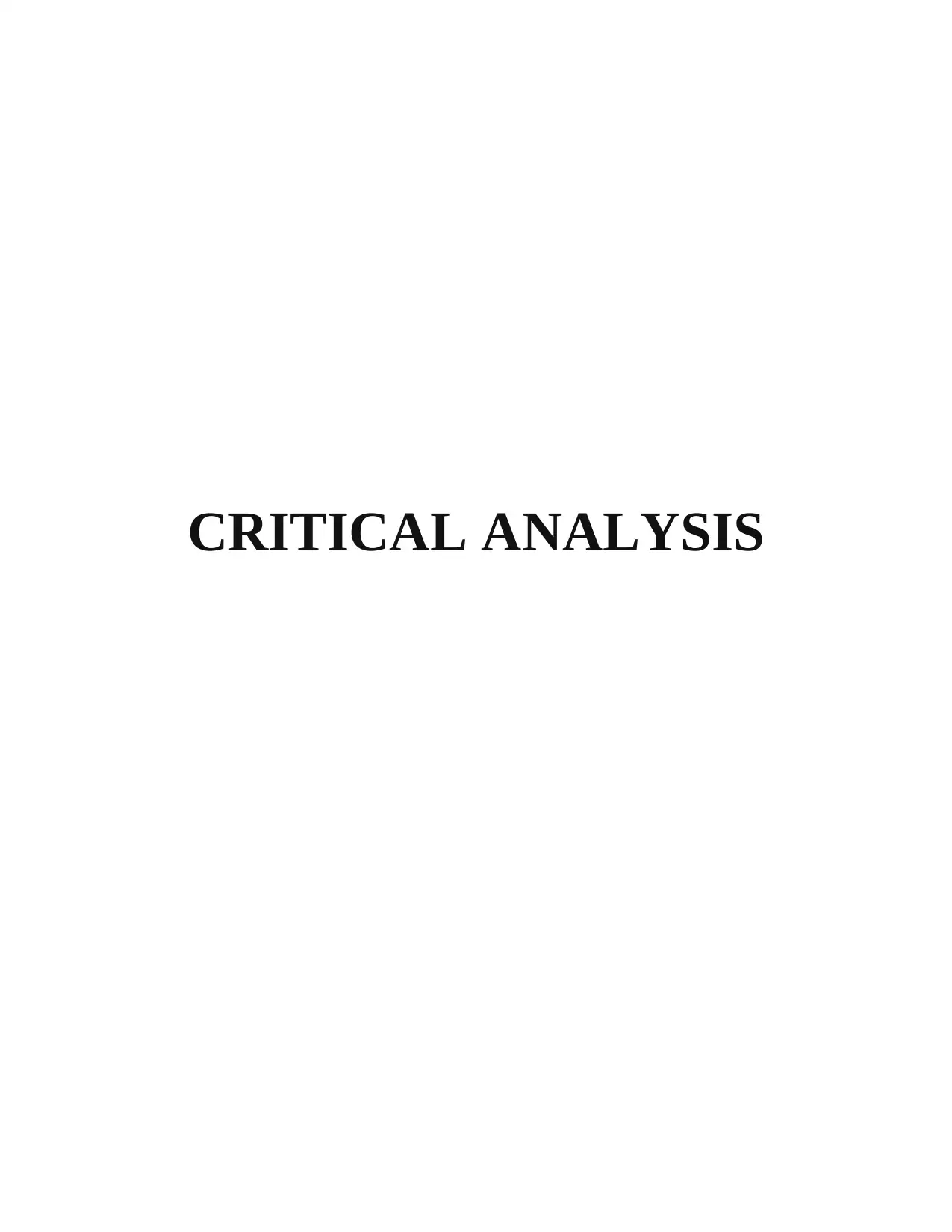
CRITICAL ANALYSIS
Secure Best Marks with AI Grader
Need help grading? Try our AI Grader for instant feedback on your assignments.
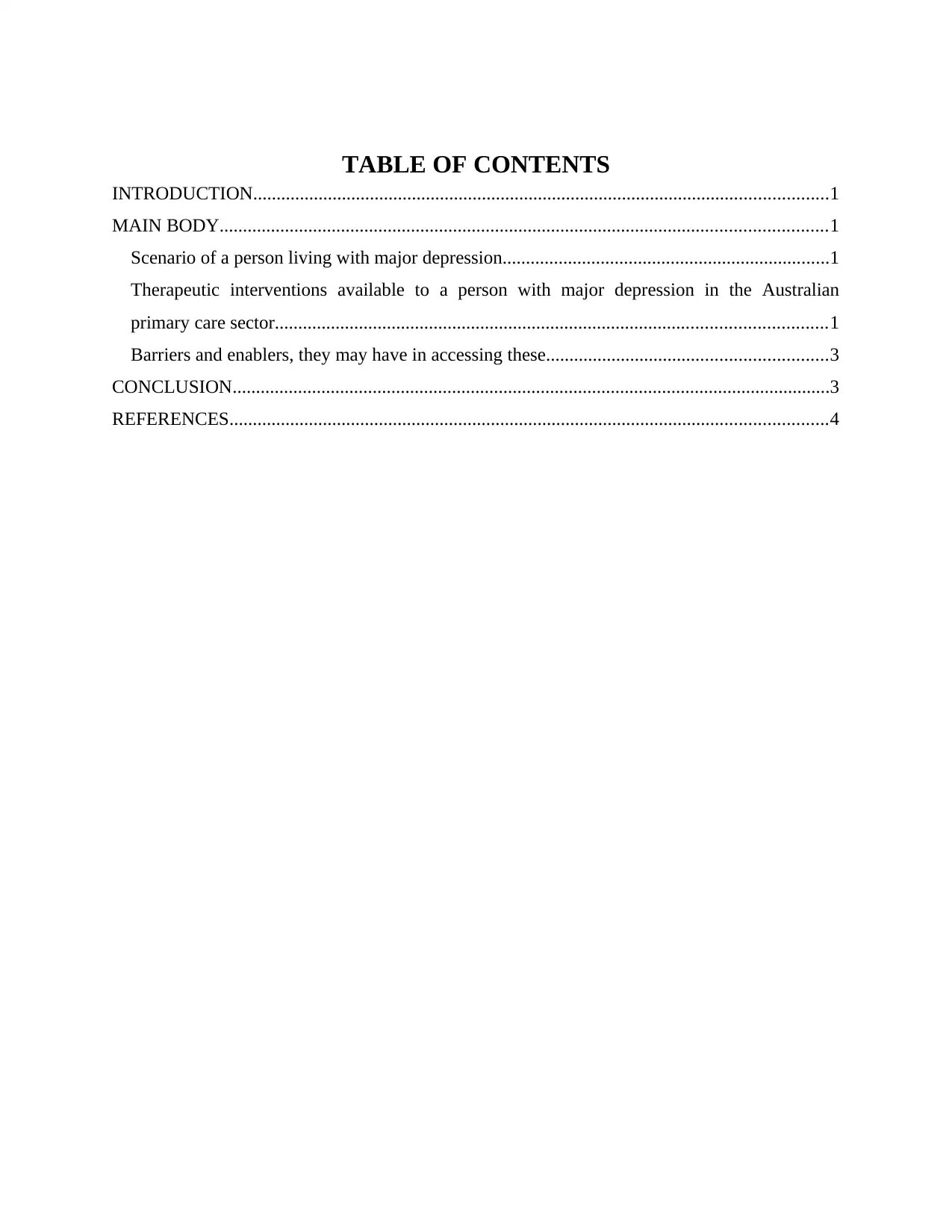
TABLE OF CONTENTS
INTRODUCTION...........................................................................................................................1
MAIN BODY..................................................................................................................................1
Scenario of a person living with major depression......................................................................1
Therapeutic interventions available to a person with major depression in the Australian
primary care sector......................................................................................................................1
Barriers and enablers, they may have in accessing these............................................................3
CONCLUSION................................................................................................................................3
REFERENCES................................................................................................................................4
INTRODUCTION...........................................................................................................................1
MAIN BODY..................................................................................................................................1
Scenario of a person living with major depression......................................................................1
Therapeutic interventions available to a person with major depression in the Australian
primary care sector......................................................................................................................1
Barriers and enablers, they may have in accessing these............................................................3
CONCLUSION................................................................................................................................3
REFERENCES................................................................................................................................4
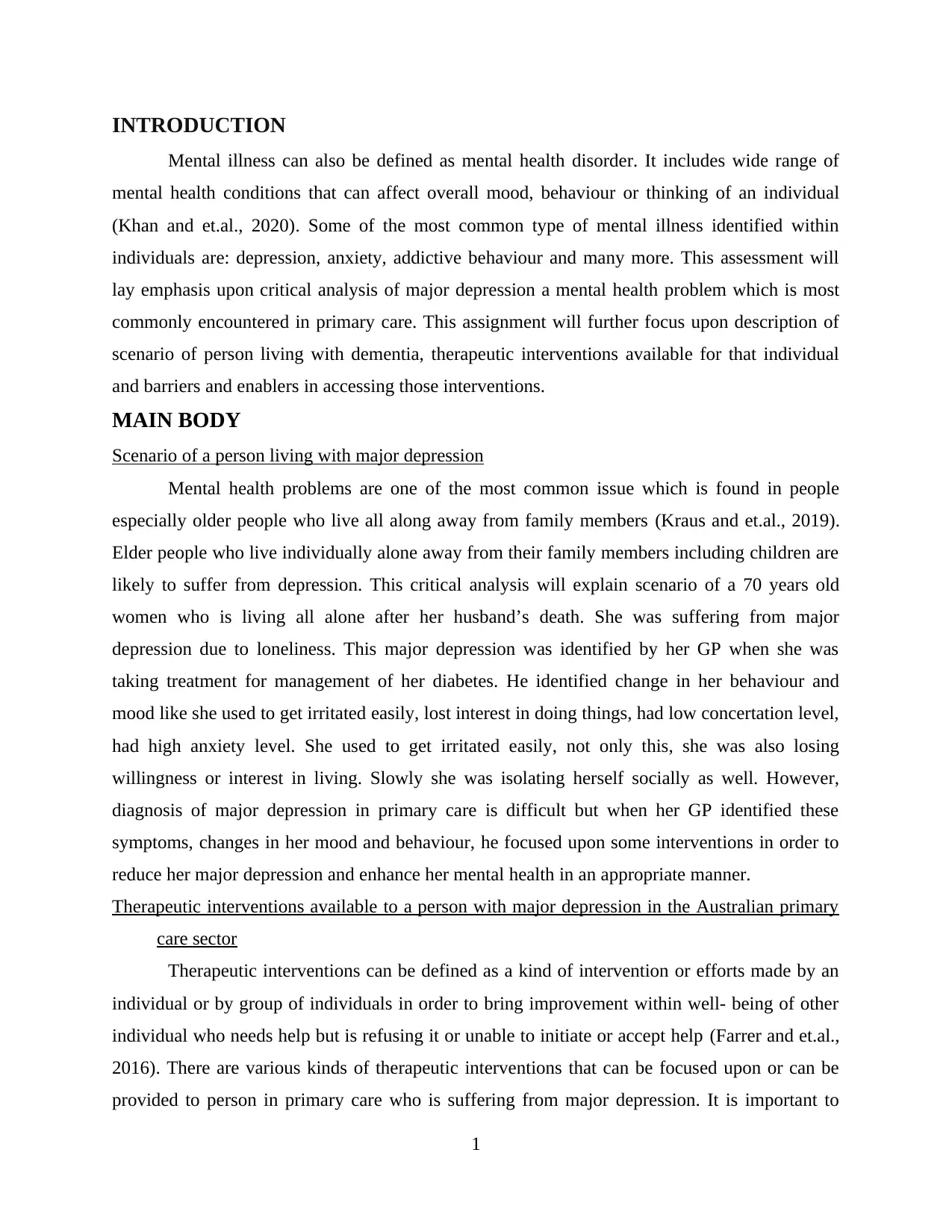
INTRODUCTION
Mental illness can also be defined as mental health disorder. It includes wide range of
mental health conditions that can affect overall mood, behaviour or thinking of an individual
(Khan and et.al., 2020). Some of the most common type of mental illness identified within
individuals are: depression, anxiety, addictive behaviour and many more. This assessment will
lay emphasis upon critical analysis of major depression a mental health problem which is most
commonly encountered in primary care. This assignment will further focus upon description of
scenario of person living with dementia, therapeutic interventions available for that individual
and barriers and enablers in accessing those interventions.
MAIN BODY
Scenario of a person living with major depression
Mental health problems are one of the most common issue which is found in people
especially older people who live all along away from family members (Kraus and et.al., 2019).
Elder people who live individually alone away from their family members including children are
likely to suffer from depression. This critical analysis will explain scenario of a 70 years old
women who is living all alone after her husband’s death. She was suffering from major
depression due to loneliness. This major depression was identified by her GP when she was
taking treatment for management of her diabetes. He identified change in her behaviour and
mood like she used to get irritated easily, lost interest in doing things, had low concertation level,
had high anxiety level. She used to get irritated easily, not only this, she was also losing
willingness or interest in living. Slowly she was isolating herself socially as well. However,
diagnosis of major depression in primary care is difficult but when her GP identified these
symptoms, changes in her mood and behaviour, he focused upon some interventions in order to
reduce her major depression and enhance her mental health in an appropriate manner.
Therapeutic interventions available to a person with major depression in the Australian primary
care sector
Therapeutic interventions can be defined as a kind of intervention or efforts made by an
individual or by group of individuals in order to bring improvement within well- being of other
individual who needs help but is refusing it or unable to initiate or accept help (Farrer and et.al.,
2016). There are various kinds of therapeutic interventions that can be focused upon or can be
provided to person in primary care who is suffering from major depression. It is important to
1
Mental illness can also be defined as mental health disorder. It includes wide range of
mental health conditions that can affect overall mood, behaviour or thinking of an individual
(Khan and et.al., 2020). Some of the most common type of mental illness identified within
individuals are: depression, anxiety, addictive behaviour and many more. This assessment will
lay emphasis upon critical analysis of major depression a mental health problem which is most
commonly encountered in primary care. This assignment will further focus upon description of
scenario of person living with dementia, therapeutic interventions available for that individual
and barriers and enablers in accessing those interventions.
MAIN BODY
Scenario of a person living with major depression
Mental health problems are one of the most common issue which is found in people
especially older people who live all along away from family members (Kraus and et.al., 2019).
Elder people who live individually alone away from their family members including children are
likely to suffer from depression. This critical analysis will explain scenario of a 70 years old
women who is living all alone after her husband’s death. She was suffering from major
depression due to loneliness. This major depression was identified by her GP when she was
taking treatment for management of her diabetes. He identified change in her behaviour and
mood like she used to get irritated easily, lost interest in doing things, had low concertation level,
had high anxiety level. She used to get irritated easily, not only this, she was also losing
willingness or interest in living. Slowly she was isolating herself socially as well. However,
diagnosis of major depression in primary care is difficult but when her GP identified these
symptoms, changes in her mood and behaviour, he focused upon some interventions in order to
reduce her major depression and enhance her mental health in an appropriate manner.
Therapeutic interventions available to a person with major depression in the Australian primary
care sector
Therapeutic interventions can be defined as a kind of intervention or efforts made by an
individual or by group of individuals in order to bring improvement within well- being of other
individual who needs help but is refusing it or unable to initiate or accept help (Farrer and et.al.,
2016). There are various kinds of therapeutic interventions that can be focused upon or can be
provided to person in primary care who is suffering from major depression. It is important to
1
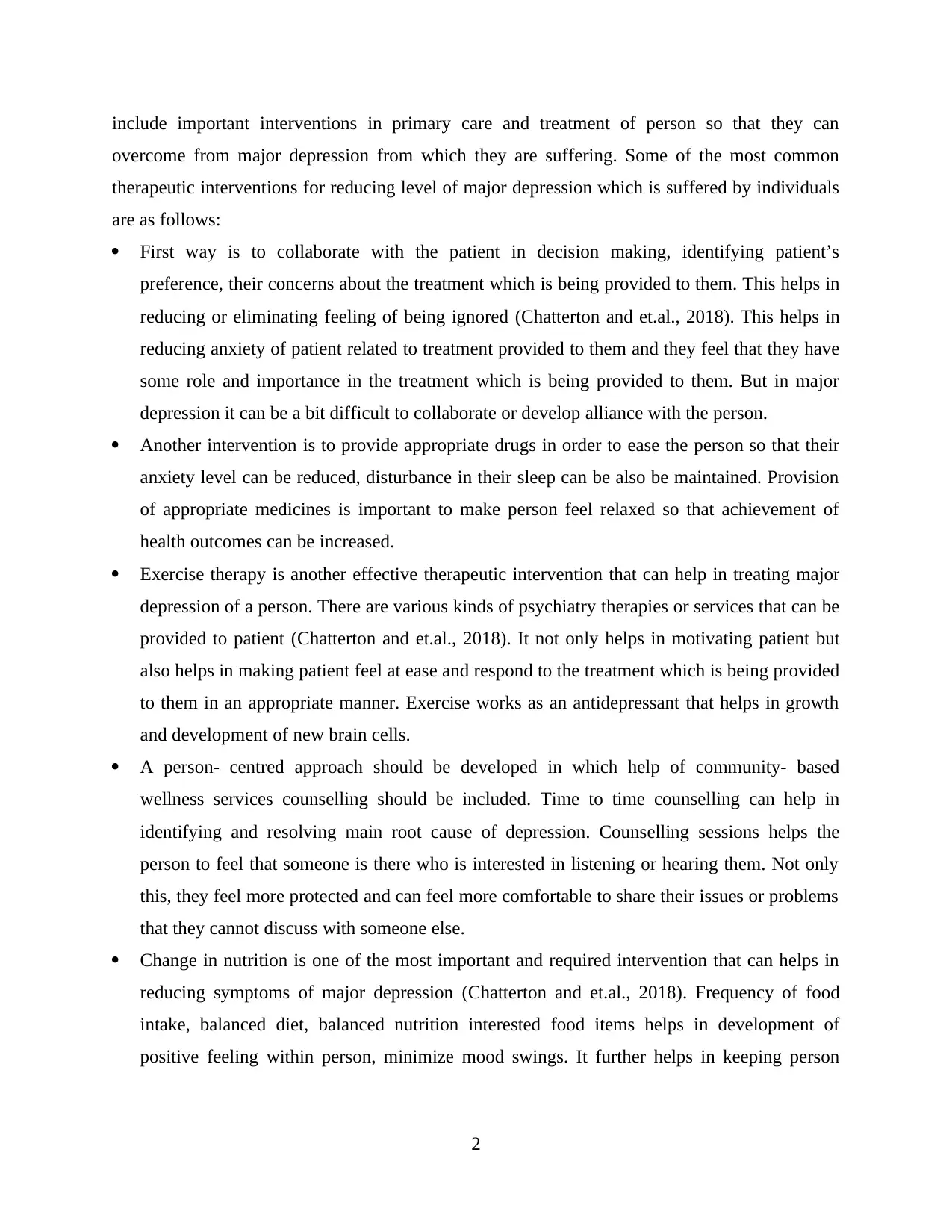
include important interventions in primary care and treatment of person so that they can
overcome from major depression from which they are suffering. Some of the most common
therapeutic interventions for reducing level of major depression which is suffered by individuals
are as follows:
First way is to collaborate with the patient in decision making, identifying patient’s
preference, their concerns about the treatment which is being provided to them. This helps in
reducing or eliminating feeling of being ignored (Chatterton and et.al., 2018). This helps in
reducing anxiety of patient related to treatment provided to them and they feel that they have
some role and importance in the treatment which is being provided to them. But in major
depression it can be a bit difficult to collaborate or develop alliance with the person.
Another intervention is to provide appropriate drugs in order to ease the person so that their
anxiety level can be reduced, disturbance in their sleep can be also be maintained. Provision
of appropriate medicines is important to make person feel relaxed so that achievement of
health outcomes can be increased.
Exercise therapy is another effective therapeutic intervention that can help in treating major
depression of a person. There are various kinds of psychiatry therapies or services that can be
provided to patient (Chatterton and et.al., 2018). It not only helps in motivating patient but
also helps in making patient feel at ease and respond to the treatment which is being provided
to them in an appropriate manner. Exercise works as an antidepressant that helps in growth
and development of new brain cells.
A person- centred approach should be developed in which help of community- based
wellness services counselling should be included. Time to time counselling can help in
identifying and resolving main root cause of depression. Counselling sessions helps the
person to feel that someone is there who is interested in listening or hearing them. Not only
this, they feel more protected and can feel more comfortable to share their issues or problems
that they cannot discuss with someone else.
Change in nutrition is one of the most important and required intervention that can helps in
reducing symptoms of major depression (Chatterton and et.al., 2018). Frequency of food
intake, balanced diet, balanced nutrition interested food items helps in development of
positive feeling within person, minimize mood swings. It further helps in keeping person
2
overcome from major depression from which they are suffering. Some of the most common
therapeutic interventions for reducing level of major depression which is suffered by individuals
are as follows:
First way is to collaborate with the patient in decision making, identifying patient’s
preference, their concerns about the treatment which is being provided to them. This helps in
reducing or eliminating feeling of being ignored (Chatterton and et.al., 2018). This helps in
reducing anxiety of patient related to treatment provided to them and they feel that they have
some role and importance in the treatment which is being provided to them. But in major
depression it can be a bit difficult to collaborate or develop alliance with the person.
Another intervention is to provide appropriate drugs in order to ease the person so that their
anxiety level can be reduced, disturbance in their sleep can be also be maintained. Provision
of appropriate medicines is important to make person feel relaxed so that achievement of
health outcomes can be increased.
Exercise therapy is another effective therapeutic intervention that can help in treating major
depression of a person. There are various kinds of psychiatry therapies or services that can be
provided to patient (Chatterton and et.al., 2018). It not only helps in motivating patient but
also helps in making patient feel at ease and respond to the treatment which is being provided
to them in an appropriate manner. Exercise works as an antidepressant that helps in growth
and development of new brain cells.
A person- centred approach should be developed in which help of community- based
wellness services counselling should be included. Time to time counselling can help in
identifying and resolving main root cause of depression. Counselling sessions helps the
person to feel that someone is there who is interested in listening or hearing them. Not only
this, they feel more protected and can feel more comfortable to share their issues or problems
that they cannot discuss with someone else.
Change in nutrition is one of the most important and required intervention that can helps in
reducing symptoms of major depression (Chatterton and et.al., 2018). Frequency of food
intake, balanced diet, balanced nutrition interested food items helps in development of
positive feeling within person, minimize mood swings. It further helps in keeping person
2
Secure Best Marks with AI Grader
Need help grading? Try our AI Grader for instant feedback on your assignments.
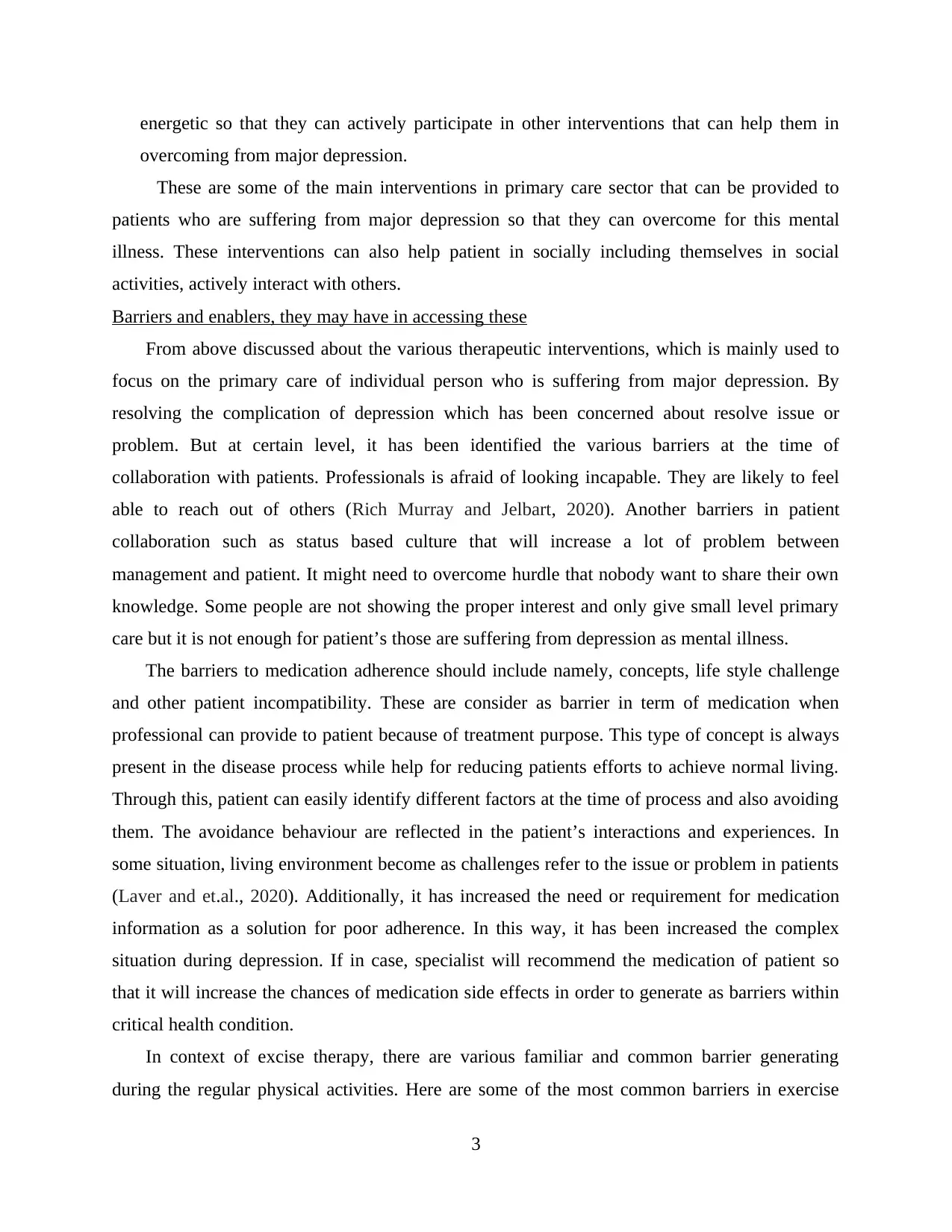
energetic so that they can actively participate in other interventions that can help them in
overcoming from major depression.
These are some of the main interventions in primary care sector that can be provided to
patients who are suffering from major depression so that they can overcome for this mental
illness. These interventions can also help patient in socially including themselves in social
activities, actively interact with others.
Barriers and enablers, they may have in accessing these
From above discussed about the various therapeutic interventions, which is mainly used to
focus on the primary care of individual person who is suffering from major depression. By
resolving the complication of depression which has been concerned about resolve issue or
problem. But at certain level, it has been identified the various barriers at the time of
collaboration with patients. Professionals is afraid of looking incapable. They are likely to feel
able to reach out of others (Rich Murray and Jelbart, 2020). Another barriers in patient
collaboration such as status based culture that will increase a lot of problem between
management and patient. It might need to overcome hurdle that nobody want to share their own
knowledge. Some people are not showing the proper interest and only give small level primary
care but it is not enough for patient’s those are suffering from depression as mental illness.
The barriers to medication adherence should include namely, concepts, life style challenge
and other patient incompatibility. These are consider as barrier in term of medication when
professional can provide to patient because of treatment purpose. This type of concept is always
present in the disease process while help for reducing patients efforts to achieve normal living.
Through this, patient can easily identify different factors at the time of process and also avoiding
them. The avoidance behaviour are reflected in the patient’s interactions and experiences. In
some situation, living environment become as challenges refer to the issue or problem in patients
(Laver and et.al., 2020). Additionally, it has increased the need or requirement for medication
information as a solution for poor adherence. In this way, it has been increased the complex
situation during depression. If in case, specialist will recommend the medication of patient so
that it will increase the chances of medication side effects in order to generate as barriers within
critical health condition.
In context of excise therapy, there are various familiar and common barrier generating
during the regular physical activities. Here are some of the most common barriers in exercise
3
overcoming from major depression.
These are some of the main interventions in primary care sector that can be provided to
patients who are suffering from major depression so that they can overcome for this mental
illness. These interventions can also help patient in socially including themselves in social
activities, actively interact with others.
Barriers and enablers, they may have in accessing these
From above discussed about the various therapeutic interventions, which is mainly used to
focus on the primary care of individual person who is suffering from major depression. By
resolving the complication of depression which has been concerned about resolve issue or
problem. But at certain level, it has been identified the various barriers at the time of
collaboration with patients. Professionals is afraid of looking incapable. They are likely to feel
able to reach out of others (Rich Murray and Jelbart, 2020). Another barriers in patient
collaboration such as status based culture that will increase a lot of problem between
management and patient. It might need to overcome hurdle that nobody want to share their own
knowledge. Some people are not showing the proper interest and only give small level primary
care but it is not enough for patient’s those are suffering from depression as mental illness.
The barriers to medication adherence should include namely, concepts, life style challenge
and other patient incompatibility. These are consider as barrier in term of medication when
professional can provide to patient because of treatment purpose. This type of concept is always
present in the disease process while help for reducing patients efforts to achieve normal living.
Through this, patient can easily identify different factors at the time of process and also avoiding
them. The avoidance behaviour are reflected in the patient’s interactions and experiences. In
some situation, living environment become as challenges refer to the issue or problem in patients
(Laver and et.al., 2020). Additionally, it has increased the need or requirement for medication
information as a solution for poor adherence. In this way, it has been increased the complex
situation during depression. If in case, specialist will recommend the medication of patient so
that it will increase the chances of medication side effects in order to generate as barriers within
critical health condition.
In context of excise therapy, there are various familiar and common barrier generating
during the regular physical activities. Here are some of the most common barriers in exercise
3
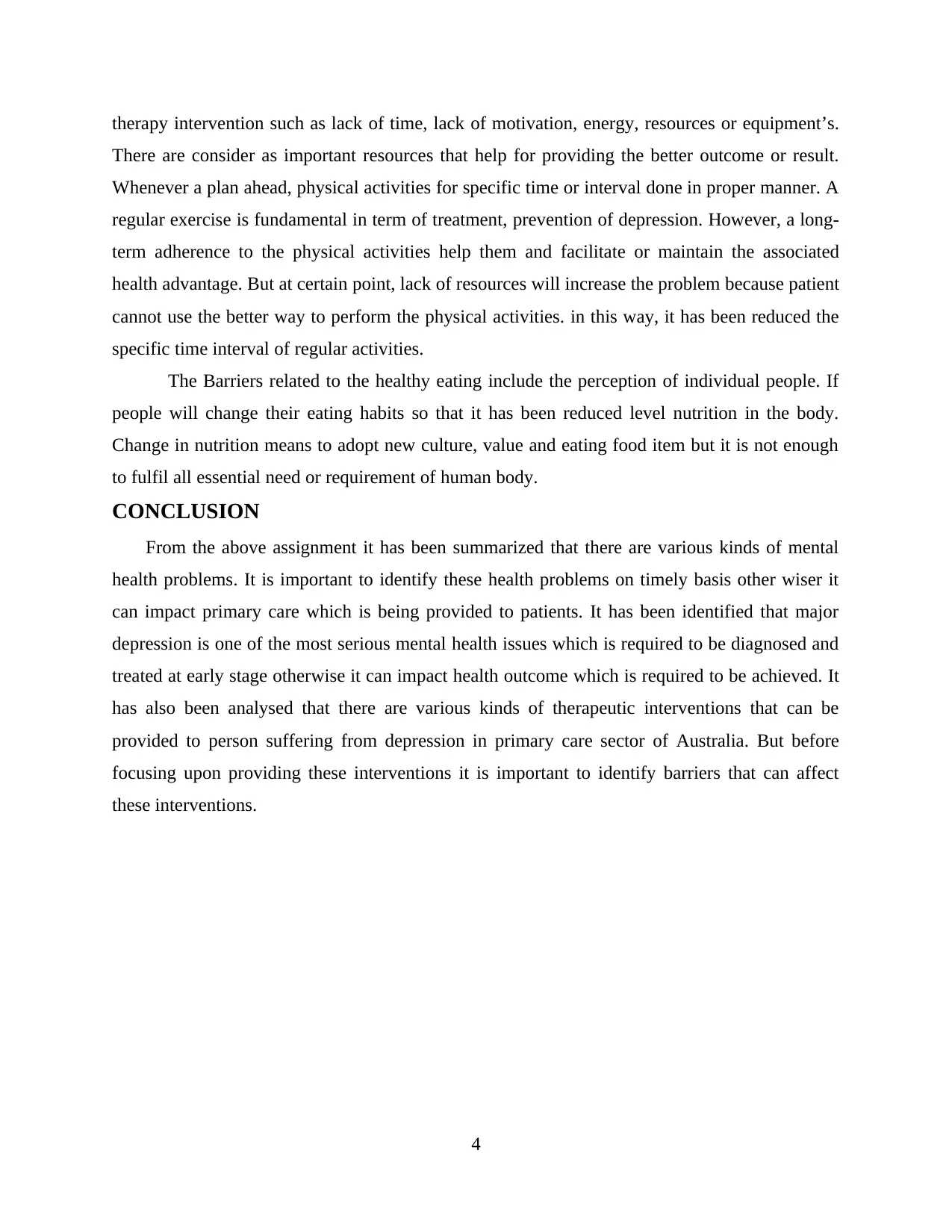
therapy intervention such as lack of time, lack of motivation, energy, resources or equipment’s.
There are consider as important resources that help for providing the better outcome or result.
Whenever a plan ahead, physical activities for specific time or interval done in proper manner. A
regular exercise is fundamental in term of treatment, prevention of depression. However, a long-
term adherence to the physical activities help them and facilitate or maintain the associated
health advantage. But at certain point, lack of resources will increase the problem because patient
cannot use the better way to perform the physical activities. in this way, it has been reduced the
specific time interval of regular activities.
The Barriers related to the healthy eating include the perception of individual people. If
people will change their eating habits so that it has been reduced level nutrition in the body.
Change in nutrition means to adopt new culture, value and eating food item but it is not enough
to fulfil all essential need or requirement of human body.
CONCLUSION
From the above assignment it has been summarized that there are various kinds of mental
health problems. It is important to identify these health problems on timely basis other wiser it
can impact primary care which is being provided to patients. It has been identified that major
depression is one of the most serious mental health issues which is required to be diagnosed and
treated at early stage otherwise it can impact health outcome which is required to be achieved. It
has also been analysed that there are various kinds of therapeutic interventions that can be
provided to person suffering from depression in primary care sector of Australia. But before
focusing upon providing these interventions it is important to identify barriers that can affect
these interventions.
4
There are consider as important resources that help for providing the better outcome or result.
Whenever a plan ahead, physical activities for specific time or interval done in proper manner. A
regular exercise is fundamental in term of treatment, prevention of depression. However, a long-
term adherence to the physical activities help them and facilitate or maintain the associated
health advantage. But at certain point, lack of resources will increase the problem because patient
cannot use the better way to perform the physical activities. in this way, it has been reduced the
specific time interval of regular activities.
The Barriers related to the healthy eating include the perception of individual people. If
people will change their eating habits so that it has been reduced level nutrition in the body.
Change in nutrition means to adopt new culture, value and eating food item but it is not enough
to fulfil all essential need or requirement of human body.
CONCLUSION
From the above assignment it has been summarized that there are various kinds of mental
health problems. It is important to identify these health problems on timely basis other wiser it
can impact primary care which is being provided to patients. It has been identified that major
depression is one of the most serious mental health issues which is required to be diagnosed and
treated at early stage otherwise it can impact health outcome which is required to be achieved. It
has also been analysed that there are various kinds of therapeutic interventions that can be
provided to person suffering from depression in primary care sector of Australia. But before
focusing upon providing these interventions it is important to identify barriers that can affect
these interventions.
4
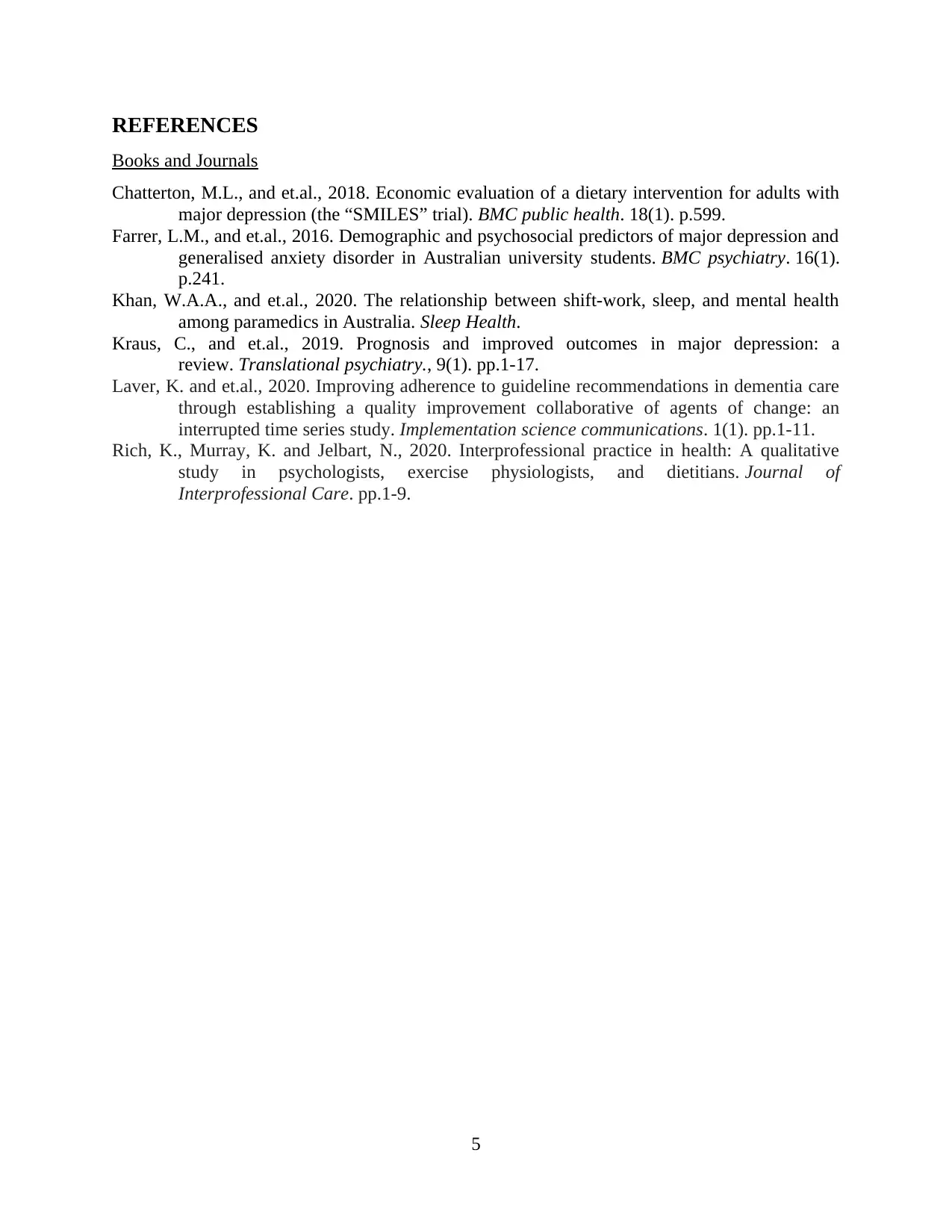
REFERENCES
Books and Journals
Chatterton, M.L., and et.al., 2018. Economic evaluation of a dietary intervention for adults with
major depression (the “SMILES” trial). BMC public health. 18(1). p.599.
Farrer, L.M., and et.al., 2016. Demographic and psychosocial predictors of major depression and
generalised anxiety disorder in Australian university students. BMC psychiatry. 16(1).
p.241.
Khan, W.A.A., and et.al., 2020. The relationship between shift-work, sleep, and mental health
among paramedics in Australia. Sleep Health.
Kraus, C., and et.al., 2019. Prognosis and improved outcomes in major depression: a
review. Translational psychiatry., 9(1). pp.1-17.
Laver, K. and et.al., 2020. Improving adherence to guideline recommendations in dementia care
through establishing a quality improvement collaborative of agents of change: an
interrupted time series study. Implementation science communications. 1(1). pp.1-11.
Rich, K., Murray, K. and Jelbart, N., 2020. Interprofessional practice in health: A qualitative
study in psychologists, exercise physiologists, and dietitians. Journal of
Interprofessional Care. pp.1-9.
5
Books and Journals
Chatterton, M.L., and et.al., 2018. Economic evaluation of a dietary intervention for adults with
major depression (the “SMILES” trial). BMC public health. 18(1). p.599.
Farrer, L.M., and et.al., 2016. Demographic and psychosocial predictors of major depression and
generalised anxiety disorder in Australian university students. BMC psychiatry. 16(1).
p.241.
Khan, W.A.A., and et.al., 2020. The relationship between shift-work, sleep, and mental health
among paramedics in Australia. Sleep Health.
Kraus, C., and et.al., 2019. Prognosis and improved outcomes in major depression: a
review. Translational psychiatry., 9(1). pp.1-17.
Laver, K. and et.al., 2020. Improving adherence to guideline recommendations in dementia care
through establishing a quality improvement collaborative of agents of change: an
interrupted time series study. Implementation science communications. 1(1). pp.1-11.
Rich, K., Murray, K. and Jelbart, N., 2020. Interprofessional practice in health: A qualitative
study in psychologists, exercise physiologists, and dietitians. Journal of
Interprofessional Care. pp.1-9.
5
1 out of 7
Related Documents
Your All-in-One AI-Powered Toolkit for Academic Success.
+13062052269
info@desklib.com
Available 24*7 on WhatsApp / Email
![[object Object]](/_next/static/media/star-bottom.7253800d.svg)
Unlock your academic potential
© 2024 | Zucol Services PVT LTD | All rights reserved.




